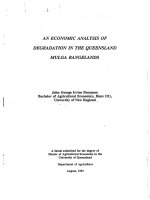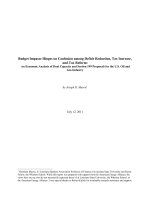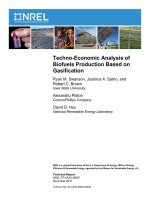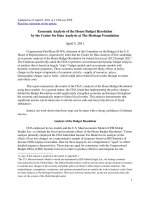Economic analysis of production of cut roses under Polyhouses in western Maharashtra
Bạn đang xem bản rút gọn của tài liệu. Xem và tải ngay bản đầy đủ của tài liệu tại đây (259.13 KB, 8 trang )
Int.J.Curr.Microbiol.App.Sci (2019) 8(2): 234-241
International Journal of Current Microbiology and Applied Sciences
ISSN: 2319-7706 Volume 8 Number 02 (2019)
Journal homepage:
Original Research Article
/>
Economic Analysis of Production of Cut Roses under Polyhouses in
Western Maharashtra
M.N. Waghmare* and P.N. Shendage
Associate Professor of Agricultural Economics, College of Agriculture,
Pune (Maharashtra), India
*Corresponding author
ABSTRACT
Keywords
Economic analysis,
Polyhouses, Cut
roses
Article Info
Accepted:
04 January 2019
Available Online:
10 February 2019
Floriculture industry in India is in a boom in recent years. Maharashtra is the leading state
in India for cut roses consumption and export. The study is based on data collected from
30 producers growing cut roses in polyhouses around Pune city for the year 2013-14. The
average cost of erection of polyhouse (0.24 ha.) was around Rs.23.13 Lakhs. The average
cost of cultivation of cut roses was worked to Rs. 5.97 lakh and it was decreased across the
size group of polyhouses. The major items of cost involved were hired human labour,
planting material, fertilizers, plant protection chemicals and bed preparation. The average
profit realized was Rs.10, 25417 with B:C ratio 1.72. The average cost of marketing was
estimated to Rs.18.60/bundle. The winter season produce had reaped the maximum prices,
whereas exported produce fetched more prices. In export, Channel-III (Cut roses producer
– Importer- Wholesaler- Retailer- Consumer) proved to be more efficient. The farmer
should adopt the production technology in such a way that maximum produce should be
available for marketing during 25th January to 10th February in order to reap the benefit of
maximum prices.
Maharashtra Floriculture Development Board
(MFDB) is operating with its head quarter at
Pune. Economic analysis of such capital
intensive technique is useful for taking
decisions regarding its viability as an
agribusiness. Therefore, an attempt has been
made in this paper to analyze the situation of
production and marketing of cut roses grown
under polyhouses.
Introduction
Greenhouses in India are being used to grow
vegetables and flowers all the year round. In
Maharashtra, high-tech floriculture is
increasing rapidly particularly in Western
Maharashtra.
The
most
conspicuous
development around Pune city is the
increasing entries of major players using
capital-intensive techniques and bringing
techno-revolution in the floriculture trade.
The polyhouse technology now a day has
become very popular in and around Pune city.
More than 60 per cent polyhouses in the State
are concentrated around Pune city. The
Materials and Methods
As per recent statistics available with the
Directorate of Horticulture, Govt. of
Maharashtra, Pune, the total area under the
234
Int.J.Curr.Microbiol.App.Sci (2019) 8(2): 234-241
polyhouse cultivation in the state is 190 ha.
Of this area, 120 ha (63.16 %) is in Pune
district; which is concentrated in Maval,
Haveli, Shirur, Mulashi, Rajgurunagar and
Ambegaon tahsils of the district. The cut
flower selected for the study was roses. The
relevant data pertaining to the year 2011-12
were obtained with the help of designed
questionnaires by personal interview method.
A sample of 30 polyhouse owners growing of
cut roses will be drawn through systematic
random sampling, 10 each from small (up to
0.10 ha.), medium (0.11 to 0.20 ha.) and
large (0.21ha. and above). Tabular method of
analysis was employed for analysis of data
besides the use of standard concepts. The
efficiency of marketing channels was
estimated by using Acharya’s marketing
efficiency formula.
(0.10 ha.) medium (0.19 ha.) and large (0.43
ha.) size groups. It can be inferred that the per
unit average cost of erection of polyhouses do
not very greatly with the size of polyhouses.
The G.I. material was used as a framework
and, therefore, the framework cost shared
about 50 – 53 per cent in the total cost. The
other items of cost included cost towards
polyfilm, shed net, systems for irrigation,
spraying, fertigation, labour and other related
costs. The average expected life of all the
erected structures considered to be 20 years.
The Government has provided 25 per cent
subsidy on total cost of erection of
polyhouses. Thus, average cost of erection of
polyhouse was worked to Rs. 17.32 lakhs.
The figures for the small, medium and large
size polyhouse were Rs.7.38, 14.14 and 30.45
lakhs, respectively.
Results and Discussion
Cost of cultivation
General information about the polyhouses
and the produce
Establishment cost of polyhouses
As could be seen from Table 2 that the
average cost of cultivation of cut roses were
worked to Rs.5.97 lakh. It was Rs.2.70 lakh
for small sized polyhouse, Rs.4.55 Lakh for
medium sized polyhouse and Rs.10.66 lakh
for large sized polyhouse. The Cost ‘A’
shared 58 to 62 per cent to the total cost of
cultivation for cut roses. The major items of
cost involved hired human labour, planting
material,
fertilizers,
plant
protection
chemicals, bed preparation, depreciation and
interest on working capital. In the Cost B,
both the items i.e. rental value of owned land
and interest on fixed capital together shared
25 to 36 per cent of the total cost. The family
labour shared 4 to 16 per, it was more in small
sized groups while less in large sized groups.
The estimated cost of erection of these
polyhouses were estimated and depicted in
Table 1. The average costs of construction of
polyhouses were more than 23.13 Lakhs. It is
more than Rs. 9.84 Lakhs, Rs. 18.85 Lakhs
and Rs.40.61 Lakhs, respectively for small
The cost of cultivation of small size group in
relation to others was higher. Small size
group involved intensive input use in terms of
fertilizer, planting material irrigation and
plant protection chemicals. The imputed cost
in the case of large sized group increased due
Two types of polyhouses were observed i.e.
GH –1 naturally ventilated (67 per cent) and
GH-2 partially controlled (33 per cent). The
growers opined the life period of the planting
material for roses as 4 - 5 years. Almost all
the polyhouses were constructed between
2008-2011. The cut rose flowers had the
keeping quality up to 8-9 days. The produce
was grown on raised beds with drip irrigation
system. Nearly 94 per cent harvesting was
made with regular cuttings and 6 per cent on
need basis.
235
Int.J.Curr.Microbiol.App.Sci (2019) 8(2): 234-241
to more use of shed net and high quality
polyfilm.
Channel-II Cut roses producer – ExporterWholesaler- Retailer- Consumer
Profitability of polyhouses
Channel-III Cut roses producer – ImporterWholesaler- Retailer- Consumer
The per unit price realized for all the size
groups of polyhouses of cut roses was more
than their respective per unit cost of
production. The production cost per unit was
less in large sized group while more in small
size group of polyhouses. The B:C ratio since
workout to more than unity for all the size
group, it could be inferred that there is
economy of scale in cost of production of cut
roses. The magnitude of B:C ratio was the
highest for large size group of polyhouses
(2.08). The cut roses produced in large size
polyhouses were more of grade- I quality, as
greater than 60 per cent produce was exported
and fetched higher prices as compared to
other groups. The profitability could be
enhanced by producing still higher quality
produce (Table 3).
The disposal pattern through these channels is
depicted in Table 4.
Channel-I is the preferred for the Mumbai and
Pune market in the study area. Nearly 50 per
cent of the produce is disposed through
Channel-I.
Channel-II is preferred channel by the cut
roses producers for export of their produce
through agencies dealing in the export of cut
roses. The exporter collects the cut roses from
the producer’s field and they export it in bulk
quantity. Nearly 40 per cent of the produce is
disposed through Channel-II. Channel-II is
found to be the prominent channel for export
of cut roses in the area.
Channel-III is a direct export channel where
the grower sells his produce to different
countries. Nearly 10 per cent of the produce is
disposed through Channel-III.
Marketing of cut roses
The grading is more important for high-tech
produce because it directly reflects on the
price. It was observed that all the growers
follow the grading as per the grade
specifications. For all types of produce, the
corrugated rolling paper type of packaging
was followed. More than 50 per cent growers
sold their produces in Mumbai market,
seventy per cent produce was sold through
commission agents, 25 per cent through
retailers and remaining 5 per cent through
local sale. The intermediates charged 10 per
cent commission.
Cost of marketing
As depicted in Table 5, among the various
components of marketing cost, the
commission of the intermediaries was the
major one sharing 36- 41 per cent in the total
cost of marketing for all the cut roses.
The cost of grading and packaging in a single
unit shared 27 per cent and the cost of
transportation shared 30- 32 per cent.
Marketing channels in the study area
On an average, the marketing cost for bundle
cut roses (containing 40 flowers) in the size
class of polyhouses ranged in between
Rs.18.60. The cost of marketing decrease
across the size class of polyhouse
There are three main marketing channels
existed in the area for cut roses.
Channel-I Cut roses producer – Commission
Agent- Wholesaler- Retailer- Consumer
236
Int.J.Curr.Microbiol.App.Sci (2019) 8(2): 234-241
more efficient, but the producers commonly
using Channel-II due to simplicity.
Efficiency of marketing channel
Efficiency of the existing marketing channels
was studied in order to analyze the most
effective channel for marketing of cut roses in
the study area.
Price variation in cut roses
The average price received for cut roses was
the lowest in monsoon season. The winter
season had influenced the higher prices for
the produce. The producer realizes maximum
prices when cut roses was ready for marketing
during the period of 25th January to 10th
February to catch the demand for valentine
day. The export market paid the higher prices
for the produce followed by Mumbai market
and Pune market. As a logic, the Grade-I
produce had positive influence on the price
received (Table 7).
Table 6 shows the efficiency of the market
channels. The marketing efficiency of
Channel-I was found to be 0.27, while that of
Channel-II was 0.36 and Channel-III was
0.38. The Channel-III was most efficient as
compared to other two channels. Channel-I
was mainly used for disposal of produce to
Pune and Mumbai market; while Channel-II
and Channel-III were used for export of
produce. In export, Channel-III proved to be
Table.1 Average cost of polyhouse erection (Rs.)
Size Group of polyhouse
Sr.
No
1
2
3
4
5
6
Particulars
Overall
(N=30)
Small
(N=10)
Medium
(N=10)
Large
(N=10)
Average area (ha.)
0.10
0.19
0.43
0.24
Framework
%
Polyfilm
%
Shed net
%
Facility unit
%
Labour cost
%
Other cost
%
Total cost
512350
52.05
147820
15.02
34360
3.49
9240
0.94
118380
12.03
162190
16.48
984340
100
246085
738255
1013100
53.73
317300
16.83
96110
5.10
22050
1.17
216414
11.48
220724
11.71
1885698
100
471424.5
1414274
2027100
49.91
780050
19.21
228570
5.63
72180
1.78
462900
11.40
490505
12.08
4061305
100
1015326.25
3045979
1184183
51.25
415056.7
17.96
119680
5.18
34490
1.49
265898
11.51
291139.7
12.60
2310448
100
577611.9
1732836
Subsidy 25%
Net cost
237
Int.J.Curr.Microbiol.App.Sci (2019) 8(2): 234-241
Table.2 Share of individual cost item in the total cost of cultivation of roses (%)
Sr.
No.
Particulars
1
Size Group of polyhouse
Overall
Small
Medium
Large
Hired H. L.
8.49
9.83
9.43
9.39
2
Machinery
1.19
0.94
1.07
1.06
3
Bed (APP)
4.05
4.45
3.90
4.06
4
Fumigation
0.35
0.31
0.36
0.35
5
Plant Material(App)
3.33
3.67
3.81
3.70
6
Fertilizer
17.94
20.29
19.73
19.60
7
Irrigation
2.04
2.07
1.83
1.92
8
Pl. Protection
9.98
9.18
8.66
8.99
9
Land revenue
0.15
0.17
0.11
0.13
10
Depreciation
6.86
7.72
7.02
7.17
11
Interest on WC
3.26
3.52
3.36
3.38
12
Cost A
57.64
62.13
59.28
59.76
13
Rental value
22.15
24.34
33.08
29.21
14
Interest onFC
3.66
4.14
3.40
3.63
Cost B
83.45
90.61
95.76
92.59
Family labour
16.55
9.39
4.24
7.41
Cost C
100.00
100.00
100.00
100.00
Cost C
270636
455963
1066255
597618
Table.3 Profitability of cut roses in polyhouse cultivation (Rs)
S.No.
Particulars
Size Group of polyhouse
Small
Medium
Large
Overall
1
Output (No)
157561
277971
647655
361062
2
Cost of cultivation
270636
455963
1066255
597618
3
Cost of marketing
80820
131241
290638
167566
4
Cost of production
351456
587204
1356893
765184
5
Production cost /unit
2.23
2.11
2.10
2.00
6
Gross returns
392327
725504
2214980
1025417
7
Net returns
40871
138300
858087
345753
8
Average Price/unit
2.49
2.61
3.42
3.00
9
Profitability/ unit
0.26
0.50
1.32
1.00
10
B.C. ratio
1.45
1.59
2.08
1.72
238
Int.J.Curr.Microbiol.App.Sci (2019) 8(2): 234-241
Table.4 Disposal of cut roses through different channels
Channel
Quantity disposed
Qty (No.)
%
Channel -I
546468
50.45
Channel -II
439375
39.64
Channel -III
107344
9.91
Total
1083187
100
Table.5 Average cost of marketing. (Rs./ bundle of flower)
Sr.No. Particulars
Size Group of polyhouse
Small
Medium
Overall
Large
1
Grading and
packaging
5.60
(27.38)
5.10
(27.16)
4.90
(27.03)
5.00
(27.10)
2
Transportation
6.50
(31.74)
6.20
(32.60)
5.30
(29.42)
5.70
(30.60)
3
Commission
7.60
(37.03)
6.80
(36.26)
7.40
(40.95)
7.30
(39.10)
4
Other expenditure
0.80
(3.86)
0.80
(3.98)
0.50
(2.60)
0.60
(3.20)
5
Total
20.50
(100.0)
18.90
(100.0)
18.00
(100.0)
18.60
(100.00)
Table.6 Efficiency of marketing channels for cut roses (Per flower)
Sr.No. Particulars
Channel-I
Channel-II
Channel-III
1
Price received by grower
2.47
5.85
6.25
2
Marketing cost
1.52
2.85
2.85
3
Price paid by consumer
4.35
11.25
12.25
4
Net market margin
1.88
5.40
6.00
5
Marketing efficiency
0.27
0.36
0.38
239
Int.J.Curr.Microbiol.App.Sci (2019) 8(2): 234-241
Table.7 Price Variations in roses (Rs./ No.)
Sr.
No.
Particulars
1 Season
i)Winter
%
ii)Summer
%
iii)Monsoon
%
Total
2 Market
i)Mumbai
%
ii) Pune
%
iii) Export
%
Total
3 Grade
i) G-1
%
ii) G-II
%
iii) G-III
%
Average
Size Group of polyhouse
Small
Medium
Large
Quantity Price Quantity Price Quantity Price
63200
40.111
34650
21.99
59711
37.90
157561
3.15
55365
35.14
76346
48.45
25850
16.41
157561
3.25
34663
23.02
60150
39.95
62748
41.68
--
3.25
2.95
2.61
2.9
2.77
4.12
3.16
3.07
2.15
125645
45.20
56780
20.43
95545
34.37
277971
3.36
148136
53.29
78830
28.36
51005
18.35
277971
3.4
76720
27.60
103405
37.20
97846
35.20
2.76
3.14
2.81
3.13
2.88
4.25
3.41
3.85
3.45
2.35
263335
40.66
175580
27.11
208740
32.23
647655
3.85
121415
18.75
104700
16.17
421540
65.09
647655
3.2
421650
65.10
204050
31.51
21955
03.39
3.17
It is concluded that, the average size of
polyhouse was 0.24 ha. The average cost of
erection of polyhouse was 23.13 Lakhs. It is
Rs. 9.84 Lakhs, Rs. 18.85 Lakhs and Rs.
40.61 Lakhs, respectively for small (0.10 ha.)
medium (0.19 ha.) and large (0.43 ha.) size
groups of polyhouses. The average cost of
cultivation of cut roses was Rs. 5.97 lakhs and
it decreased across the size group of
polyhouse. The major items of cost were
hired human labour, planting material,
fertilizers, plant protection chemicals, rental
value and interest on fixed capital due to
heavy investment. The average cost of
marketing was estimated to Rs. 18.60/bundle.
Commission of the intermediaries was the
3.22
2.82
3.35
2.92
4.85
4.23
4.45
3.65
2.32
4.12
Overall
Quantity
Price
150727
41.75
89003
24.65
121332
33.60
361062
3.30
108305
29.99
86625.3
23.99
166132
46.01
361062
3.30
177678
49.21
122535
33.94
60850
16.85
361062
4.29
3.00
2.73
3.02
2.86
4.75
3.86
3.50
2.28
3.36
major component of marketing cost. All the
size group of polyhouses was in profit. The
season, market place and grade influenced the
market price of cut roses. The winter season
had influenced the higher prices for the
produce, exported produce fetched more
price. In export, Channel-III proved to be
more efficient.
Suggestions
Since the growers are commercial, they
should produce more quantities of Grade-1
produce and export more quantity and sale in
winter season in order to catch the higher
price benefit.
240
Int.J.Curr.Microbiol.App.Sci (2019) 8(2): 234-241
Farmer should adopt the production
technology in such a way that maximum
produce should be available for marketing
during 25th January to 10th February in order
to reap the benefit of maximum prices.
Rajur BC, Patil BL and Basavaraj H 2008.
Economics of chilli production in
Karnataka. Karnataka Journal of
Agricultural Sciences 21(2): 237-240.
Sindhu, G. S and Rameshkumar, 2004,
Performance of rose cut flower
varieties under unheated polyhouse
condition. Proceeding of National
Symposium on Recent Trends and
Future Strategies in Ornamental
Horticulture, Univ. Agric. Sci.,
Dharwad, Karnataka (India).
Sreedhara DS, Kerutagi MG, Basavaraja H,
Kunnal LB and Dodamani MT 2013.
Economics of capsicum production
under protected conditions in northern
Karnataka. Karnataka Journal of
Agricultural Sciences 26(2): 217-219.
References
Anonymous, 1995, Cost economics of
greenhouse cultivation of rose for one
season. NCPA Format 43-48.
Gill, A. P. S., 1984, Modren trends in
production of important cut flowers
crops. Indian Horticulture., 29(2): 37
Nagalakshmi S, Nandakumar N, Palanisamy
D and Sreenarayanan VV 2001.
Naturally ventilated polyhouse for
vegetable cultivation. South Indian
Horticulture 49: 345-346.
How to cite this article:
Waghmare, M.N. and Shendage, P.N. 2019. Economic Analysis of Production of Cut Roses
under Polyhouses in Western Maharashtra. Int.J.Curr.Microbiol.App.Sci. 8(02): 234-241.
doi: />
241









